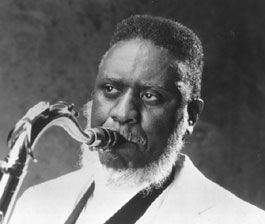home | metro santa cruz index | music & nightlife | mūz

Pharoah Sanders: Like Big Jay McNeely on steroids, only friendlier.
Mūz
Mixed Metaphors
By Bill Forman
GIANT STEPS/b> In an interview, I once asked Tom Waits why he left behind the jazz piano style of his early albums for the more experimental Captain Beefheart-oriented approach that began on his Raindogs album. At the time, I didn't actually say the word "Beefheart," because I'd heard Waits can get testy about being compared to other artists. But I later learned from Beefheart sideman Eric Feldman that Waits, in his youth, constantly hung around Beefheart's San Fernando Valley home and so immersed himself in his idol's persona that the Captain had to ask him to stop imitating him and just be himself. Anyway, Waits answered the question by dismissing jazz today as a world of nylon socks and patio lamps. This being back before the '90s lounge revival, I took this to mean that he felt jazz had lost its soul.
Waits should have been at the Kuumbwa last Thursday night, as Pharoah Sanders took the stage to remind us all how it's done. Leading a quartet that included pianist William Henderson and drummer Babatunde Lea, Sanders invoked the spirit of his old band mate with John Coltrane favorites like Giant Steps and Naima, the latter being perhaps most achingly beautiful ballad in the history of music.
But lest anyone think Sanders had gone soft, he pushed his tenor into all manner of bleating and bellowing; at one point, he stopped blowing and allowed a note to feed back into the microphone while manipulating it with the keys into what ended up becoming a percussion solo. He also raised a holy ruckus on his own You've Got To Have Freedom, maniacally overblowing its wildly infectious hook like Big Jay McNeely on steroids.
Backstage after the show, Sanders was disappointed that his reed had given him trouble, which may be why he finished out the set with a rousing chant-along. Perfectionistism notwithstanding, the packed house responded with the kind of joyful enthusiasm once reserved for rock audiences, suggesting that Waits' dreaded nylon socks and patio lights haven't won out after all.
BRILLIANT BUT NOT FRENCH The last time Garrison Keillor's name appeared in this column, it was because Bernard-Henri Lévy was coming to town and Keillor was on the warpath about him taking cheap shots at the old homeland. This time, it's an author Keillor actually likes who's coming to town. Poet Malena Morling, featured three times on Keillor's Writer's Almanac radio show, will read at Bookshop Santa Cruz on Tuesday, May 9. Of course, it could be because Morling spent her first 15 years in Sweden that Scandinaviaphile Keillor loves her so, but there's no doubting the genius of her collection, Astoria. From the opening poem's mention of a kind of moth "that feeds only on the tears of horses," to An Inventory, in which a little blonde-haired girl is selling the ocean and the moon from her beachside lemonade stand, Morling's poetry deftly brings out profound light and darkness in what we take for granted as our everyday surroundings.
Most startling of all is Late at Night, which offers up a nocturnal train ride alongside a man who is, not necessarily metaphorically, eating himself up, until his own mouth is "chewing on itself before swallowing with a throat that's already gone." I don't know if there's a Swedish equivalent to the magical realism of Latin America, but I suspect Borges would be impressed. And the fact that Morling manages to do all this without becoming the least bit morose or mawkish is all the more impressive.
Send a letter to the editor about this story.
|
|
|
|
|
|